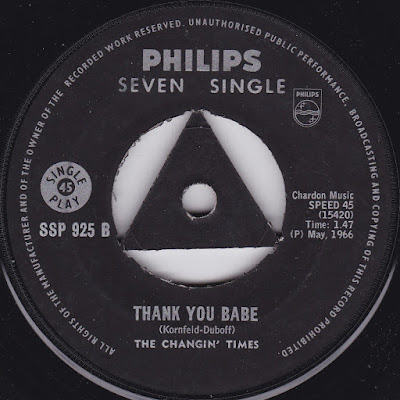Label: Philips
Year of Release (in the US): 1965
Now here's an odd find - a South African pressing of a low charting American garage single. The Changin' Times "Pied Piper" managed to climb into the lower reaches of the Billboard Top 100 on its release in 1965, but response to the record in the UK was downright indifferent on its issue here, and it took our native arrogant young gunslinger Crispian St. Peters to turn it into a monster top ten hit with a smoother, bouncier, and actually inferior version.
Maybe the original was just a bit too rough around the edges for British tastes at that time, but I think it's a thing of total wonder. From the incessant flute riff through to the raw and craggy Dylan-esque vocals, it's one of the finer pieces of pop to burst out of the naive nooks and crannies of American garage rock. Lyrically it's possible to view the disc as either being an approving nod to beatnik culture and the bourgeoning hippy movement, or an utter piss-take - my wife is utterly convinced that it's actually a fairly snarky piece of satire (the use of the phrase "so fall in line" perhaps being a criticism of the hero-worship the likes of Dylan received rather than being approving). Whatever your end conclusion, musically it's simple, sharp and delightful, and probably not seeking out underground credibility with its endless hooks.
The flip is even more raw than the A-side, throwing a rasping harmonica and spirited vocals against a thrown together minute-and-a-half ditty. It consists of the victory of youthful enthusiasm over ability and budget that so many garage records have in spades.
Despite initial appearances, though, The Changin' Times were actually songwriting duo Steve Duboff and Artie Kornfeld having a crack at fame in their own right. Besides penning "Pied Piper" they also created the original version of the "Nuggets 2" compiled garage classic "How Is The Air Up There?" Not for no reason does "Pied Piper" also have more than an inkling of pop songwriting suss about it - Kornfeld also penned the Jan and Dean classic "Dead Man's Curve", so had more than a slight notion about what he was doing.
Still, Kornfeld proved his hippy credentials by going on to become one of the main organisers of the Woodstock festival and also became a music industry "Mover n Shaker". Duboff, rather oddly, later became a video games designer though continued to write and produce music until he passed away in 2004.
"Pied Piper" was one of a brace of single The Changin' Times issued until 1968, when they finally called it a day.
Label: Philips
Year of Release (in the US): 1965
Now here's an odd find - a South African pressing of a low charting American garage single. The Changin' Times "Pied Piper" managed to climb into the lower reaches of the Billboard Top 100 on its release in 1965, but response to the record in the UK was downright indifferent on its issue here, and it took our native arrogant young gunslinger Crispian St. Peters to turn it into a monster top ten hit with a smoother, bouncier, and actually inferior version.
Maybe the original was just a bit too rough around the edges for British tastes at that time, but I think it's a thing of total wonder. From the incessant flute riff through to the raw and craggy Dylan-esque vocals, it's one of the finer pieces of pop to burst out of the naive nooks and crannies of American garage rock. Lyrically it's possible to view the disc as either being an approving nod to beatnik culture and the bourgeoning hippy movement, or an utter piss-take - my wife is utterly convinced that it's actually a fairly snarky piece of satire (the use of the phrase "so fall in line" perhaps being a criticism of the hero-worship the likes of Dylan received rather than being approving). Whatever your end conclusion, musically it's simple, sharp and delightful, and probably not seeking out underground credibility with its endless hooks.
The flip is even more raw than the A-side, throwing a rasping harmonica and spirited vocals against a thrown together minute-and-a-half ditty. It consists of the victory of youthful enthusiasm over ability and budget that so many garage records have in spades.
Despite initial appearances, though, The Changin' Times were actually songwriting duo Steve Duboff and Artie Kornfeld having a crack at fame in their own right. Besides penning "Pied Piper" they also created the original version of the "Nuggets 2" compiled garage classic "How Is The Air Up There?" Not for no reason does "Pied Piper" also have more than an inkling of pop songwriting suss about it - Kornfeld also penned the Jan and Dean classic "Dead Man's Curve", so had more than a slight notion about what he was doing.
Still, Kornfeld proved his hippy credentials by going on to become one of the main organisers of the Woodstock festival and also became a music industry "Mover n Shaker". Duboff, rather oddly, later became a video games designer though continued to write and produce music until he passed away in 2004.
"Pied Piper" was one of a brace of single The Changin' Times issued until 1968, when they finally called it a day.





